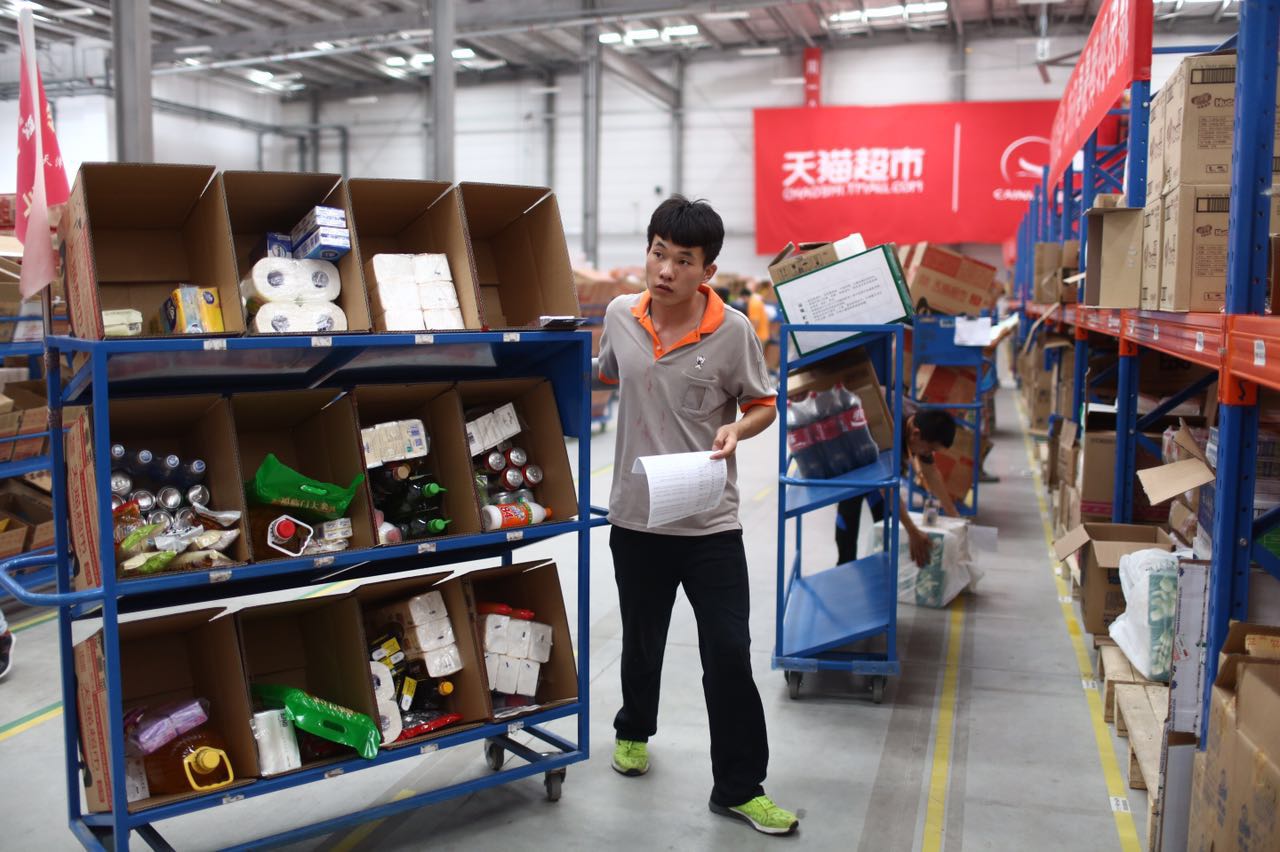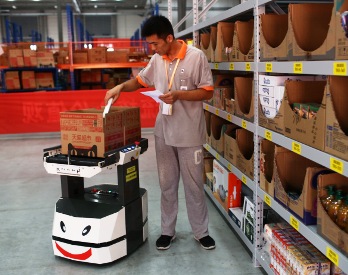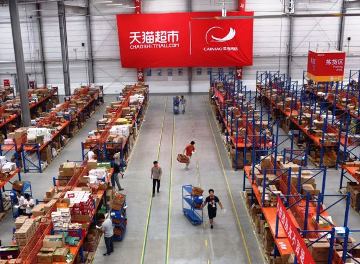
Online grocery sales in China increased by nearly 50 percent in 2014 as consumers in major cities began tapping into the convenience of Web-based shopping for everyday items. Crucial to convincing China’s masses to make e-shopping for household necessities part of their daily routine, however, is fast and reliable home delivery. No one wants to have their dinner spoiled because the cup noodles get stuck in traffic.
Working to make sure that doesn’t happen is Cainiao, the logistics affiliate of Chinese e-commerce giant Alibaba Group. Cainiao isn’t a delivery company. It’s an Alibaba-led consortium of logistics companies that partners with warehouse managers and last-mile couriers to enable speedy delivery of online orders, including fast-moving consumer goods (FMCG), to increasingly large swaths of the country.
Cainiao’s expanding network now includes fulfillment centers in Tianjin, Suzhou, Shanghai, Jinhua, Guangzhou, Chengdu and Wuhan that together provide next-day delivery of rice, snacks, personal care products and other packaged consumer goods to 41 major cities in China—and same-day grocery delivery in Beijing and Shanghai. The seven centers all support Tmall Supermarket, Alibaba Group’s online grocery business.
With online grocery sales in China expected to triple between now and 2020, according to the Institute of Grocery Distribution, e-commerce companies are racing to build market share by offering delivery of packaged consumer goods faster than the competition. This unrelenting need for speed and scale can only be met with better technology. “A warehouse for an online supermarket may look the same as a warehouse for ordinary brick-and-mortar shops,” explains Vicky Zhang, CEO of ALOG Technology Logistics. “But it is far smarter.”
ALOG, a Guangzhou, China-based logistics and warehouse management company and Cainiao partner, is responsible for a 1.37 million square-foot warehouse in a fulfillment center in Tianjin. Since opening last year, the facilityhas been supporting next and same-day deliveries of everyday items to residents of the mega-cities of Beijing and Tianjin as well as Hebei Province.
ALOG’s ace is a big-data computing engine it calls the Warehouse Management System (WMS) that is designed to optimize the efficiency of warehouse “pick-and-pack” operations,filling grocery ordersfor delivery. Developed by ALOG—the company has about 100 computer programmers—the intelligent software regularly analyzes order data to determine products shoppers typicallypurchaseat the same time, using this information to determine the optimal places toshelve some 30,000 types of products.
The goal is to minimize the distance that human pickers must travel to fill out common orders. For example, laundry detergent and shampoo are usually placed in close proximity because shoppers tend to buy them together when shopping online. With the system, Zhang said, ALOG is able to adjust its warehouse configurations on a real-time basis as consumer behavior changes according to seasonal, regional and other factors.
In addition to determining optimal warehouse layouts, the WMS system automatically selects delivery boxes appropriate for each order by calculating the size and weight of purchased goods, and maps out the best routes for stock pickers to efficiently fill up to a dozen orders at the same time.
Before adopting the system, it took about half an hour to get goods out for a single order, Zhang said. Aided by WMS, pickers can fill a 12-item order in an average of just three minutes. ALOG’s pick-and-pack operations today are overall nine times more efficient than they were three years ago, Zhang said.
Once the orders are packed and ready for delivery, Cainiao comes into the picture. Cainiao acts as a kind of air-traffic controller, using data and communications networks to coordinate the activities of its delivery partners. It’s a model that allows the company to expand geographically and improve efficiency without heavy investment in infrastructure like warehouses, trucks and drivers.
“Working with our partners allows us to easily scale up delivery capacity in new markets by leveraging existing local assets to expand networks,” explained Duan Zhiguo, senior expert at Cainiao. In Tianjin, while ALOG manages the warehouse, Cainiao partner Winshine Logistics is responsible for last-mile delivery.
The advantages of this model over e-commerce companies that own and operate their own delivery networks is reflected in the speed with which Cainiao is rolling out FCMG delivery in China. The company says next-day delivery of groceries is set to expand to 50 cities by the end of this year, and same-day delivery of groceries to 15 cities, including Guangzhou, Shenzhen, Chengdu, Tianjin, Wuhan and Nanjing.

ALOG is currently handling order volumes that are 750 times larger than they were when the company first began supporting Tmall Supermarket in 2012, Zhang said. With the ongoing development and adoption of more advanced technologies, Zhang said she’s confident Cainiao and ALOG can keep pace with the booming growth of China’s online grocery business.





